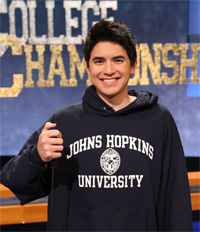
News Release
|
Office of News and Information Johns Hopkins University 901 South Bond Street, Suite 540 Baltimore, Maryland 21231 Phone: 443-287-9960 | Fax: 443-287-9920 |
May 8, 2009 FOR IMMEDIATE RELEASE CONTACT: Dennis O'Shea dro@jhu.edu 443-287-9960 |
 |
You’d never know it to watch him now – master of instant recall and quick-fingered wizard with the signaling button – but senior Scott Menke is not exactly a lifelong Jeopardy fan.
In fact, his path to success in this month’s Jeopardy College Tournament wound through a different TV show altogether: a brazenly irreverent daily sports talk show on ESPN.
“I had heard of Jeopardy, and had seen the show, but really didn't watch it at all,” said Menke, a big winner in last week’s quarterfinals who will appear Monday night, May 11, in the first of the tournament’s three semifinal matches.
“As it turned out, the way I got hooked ended up being through sports,” said the applied mathematics major in the Whiting School of Engineering. “I used to watch a show on ESPN called Pardon the Interruption every evening in high school. … They started bringing up a guy named Ken Jennings, who was having an unbelievable streak on Jeopardy.”
Menke started flipping channels after PTI to catch Jennings, who in 2004 set the Jeopardy record with an amazing 74 consecutive nightly victories.
“There was something so mesmerizing about watching him answer questions,” Menke said. “I know it sounds crazy, but it just drew me in. … There was something soothing and inevitable about Ken Jennings decimating his opponents.”
From there Menke’s interest in Jeopardy grew and grew; as a Johns Hopkins sophomore, he started setting his digital video recorder to catch every show and watched them in blocks when he got some free time.
“My roommates don't really understand my obsession,” he said. “In fact, I can't really comprehend it either. But I think I've missed only a handful of episodes over the past two years.”
Whatever sparked the obsession, it’s working for him. Menke, 21, from Flemington, N.J., blew away the competition in his quarterfinal, which aired May 5. He amassed $25,199, well over double the score of worthy competitors from Michigan State and the University of Virginia. He took four out of a possible five answers in three separate categories (High-tech Cinema, Geography and Latin), responded correctly on 32 of 36 clues and managed to ring in first on all three lucrative “daily double” clues.
“I found the third daily double, looked up to see what I should wager, and noticed that I had $27,000,” Menke said. “At that point, I thought to myself, ‘Wow, I'm going to the semifinals.’ I didn't wager very much, and decided to play it safe after that.”
One of his few misses was in Final Jeopardy (category: On the Moon), but by then it was too late: Even though he lost money on the question and both his adversaries answered correctly, they were too far behind and could not catch him.
Menke – who minors in entrepreneurship and management, is active in the Johns Hopkins Chess Club and is interested in starting a business in artificial intelligence someday -- said he greatly enjoyed his fellow competitors, students from Harvard, Princeton, Emory, Ohio State, Missouri, Kansas and St. John’s College, among others.
“We hung out a lot on the bus rides to the studio and back, and after the tapings were complete. These people know so much,” he said. “I thought I had an advantage on the buzzer, but these guys were true buffs, knowledgeable in so many areas. I can't say enough about how fortunate I was to find all three daily doubles and to get categories that I had a handle on. Luck plays a big part in this game, and I had a lot of it.”
Having the first match behind him was something of a relief, Menke says.
“I was just glad that I'd won a game, that people back home could say they know someone who'd won on Jeopardy, that my parents didn't fly to LA for nothing,” he said. “I didn't want them to leave empty-handed. … They were just having fun, but I didn't want to disappoint them.”
The three sets of three semifinalists – five daily winners from the quarterfinals and four “wild card” high scorers from among the non-winners – will appear on the air Monday, Tuesday and Wednesday for the right to advance to a two-game final to be broadcast Thursday and Friday. The semifinalists are guaranteed a $10,000 prize. The eventual champion receives a minimum of $100,000.
Menke cannot disclose the results of the semifinal match or say whether he will advance to the finals. He did say, however, that the semifinal – taped the day after the quarterfinal -- turns out to be much closer than the first-round match.
“It wasn't a runaway for anyone,” he said.


 Go to
Go to